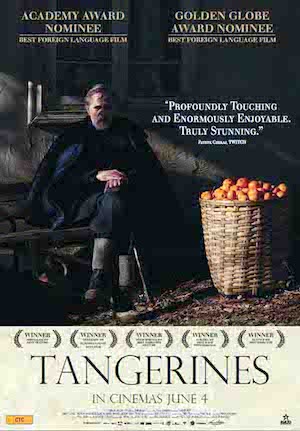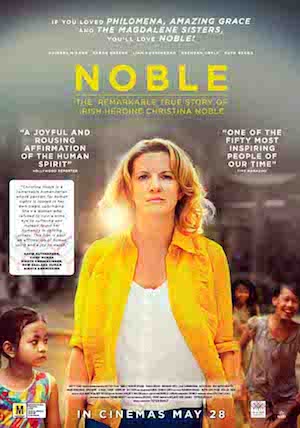 Tangerines
Tangerines
Tangerines is an anti-war fable set in Caucasus in 1992. Being able to see a movie from that part of the world is a rare treat. It has already been a winner at 11 International Film Festivals.
At that point in history civil war had broken out between newly independent Georgia and Abkhazian separatist rebels near its Northern Russian border.
A sizeable group of Estonian immigrants had settled in Georgia but as the conflict escalated most had fled back to Estonia to safety. Only a few held out. One was Margus an Estonian immigrant farmer who wanted to stay put until his tangerine crop could be harvested. His friend and neighbour, a grandfather called Ivo, also stayed behind to help out.
Ivo is busy making crates for the tangerines in his small workshop one day when a skirmish takes place in his front yard between two small bands of rival soldiers. Three soldiers die and after burying them Ivo takes the remaining two, who are heavily wounded, home to nurse back to health.
They have been fighting on opposite sides in the conflict. Ahmed is on the Abkhazian side, Niko is a Georgian. Soon the hatred between them boils up dangerously. It is only out of respect for their elderly host who has shown them so much compassion that they promise to hold off killing each other until they are sufficiently recovered to go outside.
As the weeks pass by and they are on the road to recovery Ivo continues his peace-making efforts and tries to persuade them to move beyond their ethnic differences.
The movie moves at a slow pace. In this rural setting nothing much happens beyond surviving from day to day. Sometimes we catch a glimpse of the orchard heavily laden with tangerines or the rather melancholy landscape but mostly the three men are cooped up in Ivo’s small house. Occasionally their peace is disturbed by gunfire and more skirmishes as the war comes closer to their doorstep.
Just who these soldiers are remains hidden. We find out very little about their background. Ivo also holds his family secrets close to his chest and only divulges what life events have shaped his views on war until quite late in the movie.
But it was a moving psychological drama largely thanks to the excellent performance by the legendary Estonian actor Lembit Ulfsak who played the part of Ivo and projected a calm and profound humanity as he aimed to diffuse the enmity between the two soldiers.
As the World War One commemorations continue and we are frequently confronted with horrific images of war and as conflicts rage in many parts of the world today it is hard to imagine that a solution is possible and that peace can happen on earth.
But the moral of this political fable is one which the Dalai Lama also recently wisely encapsulated in one of his sayings:
“If we see each other just as fellow human beings, there’ll be no basis for fighting and conflict between us.”
NZ Release date: 4 June 2015
 Noble
Noble
Noble celebrates the life of an amazing woman called Christina Noble who was born in a Dublin slum. But remarkably this abused child went on to change the lives of thousands of impoverished children in Thailand.
When she was ten her mother became terminally ill. Her alcoholic father could not take care of his family. Christina spent the rest of her childhood in a Catholic orphanage where she was treated abysmally by the nuns.
She ran away to Dublin, slept rough in a park and was gang raped. Pregnant she was again looked after by nuns but they took her baby from her. She married young and had three children but misfortune struck again when her husband became abusive.
At this time, when her own life is in a mess she had an astounding dream (you could almost call it a vision) about Vietnam.
Naked children are running down a dirt road fleeing from a napalm bomb. Terrified, they try to reach out to Christina for help. Above them a brilliant white light shines containing the word Vietnam.
It takes twenty more years before she can fulfil her dream. In 1989, her own children grown up now, she travels to Vietnam and is appalled at the plight of homeless street children. She can identify with them because as she says
“An Irish Gutter is the same as a Vietnamese gutter.”
With no financial backing but a heart full of love she is determined to help. Against all the odds she manages to gain support from the local authorities and to find sufficient sponsorship to set up a Foundation in Ho Chi Minh City. It has grown across Vietnam and recently Mongolia and has provided health, education and community support to thousands of needy children.
I felt somewhat conflicted when I was invited to this movie preview as well-meaning big hearted white people who go to third world countries on a whim to help, but with no understanding of the local culture often do more harm than good.
But there will always be some exceptions to the rule. And Christina was one. She treated people with respect, won their trust and listened to what they wanted. And she learnt to work closely with the government and the local community in a culturally appropriate way. Her contribution has been recognized by the President and local bodies in Vietnam showing how much they respect and value her.
This movie left me wanting to know more about the local people who worked with her to achieve her mission so successfully and how some of the children she cared for have fared. Hopefully there will be a sequel at a future date.
It was also a powerful message to show that it is possible to overcome an abusive impoverished childhood and become a power for good in this world.
NZ release date: 28 May, 2015









Join the Discussion
Type out your comment here:
You must be logged in to post a comment.